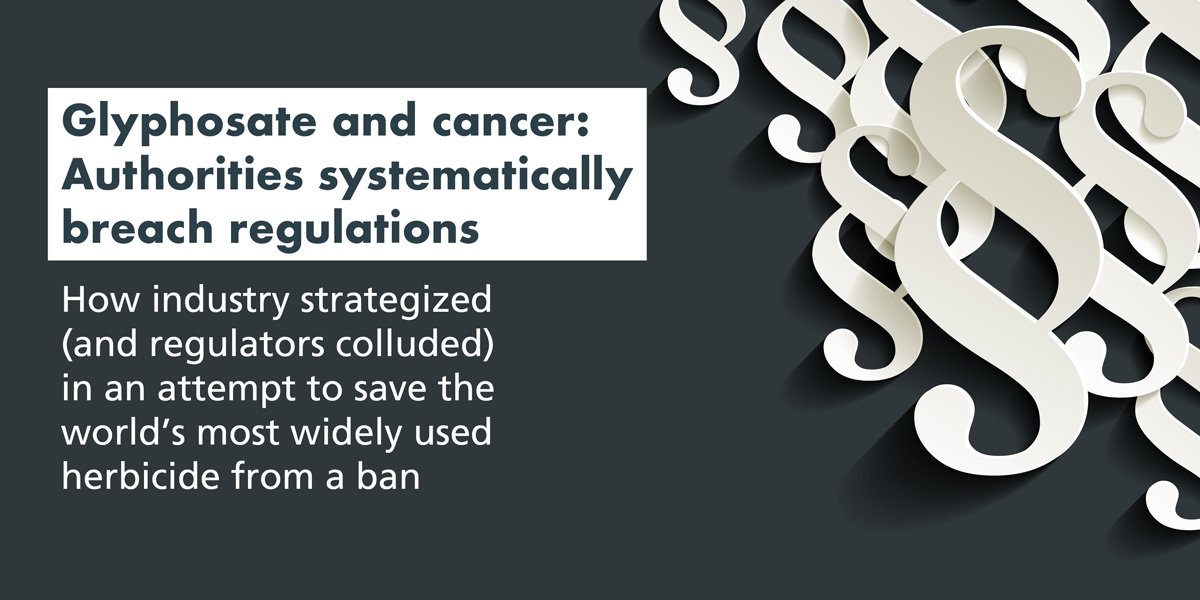
ECHA and other EU authorities broke their own rules and brushed aside evidence of cancer to conclude that glyphosate is non-carcinogenic, according to a report published by GLOBAL 2000. Now the author and editors have challenged ECHA to defend its position in a public scientific debate
GLOBAL 2000 has replied to the European Chemicals Agency’s initial response to the NGO’s recent report on glyphosate, “Glyphosate and cancer: Authorities systematically breach regulations” by challenging ECHA to a public scientific debate on glyphosate’s cancer-causing potential.
GLOBAL 2000’s report, authored by the toxicologist Dr Peter Clausing, accused the EU authorities of breaking their own rules and brushing aside evidence of cancer to keep glyphosate on the market.
In its response, the European Chemicals Agency (ECHA) said it welcomed “the scientific content of the report and the challenges it poses”, but that it “most strongly refute[s] the allegation made in [the] title of the report and the pejorative language used within it”. It added, “We also regret the contribution such language makes to maligning the trust of citizens in science and public servants.”
In a letter of reply to ECHA, Peter Clausing and the report’s editors Helmut Burtscher and Claire Robinson state that it was not their intention to offend representatives of ECHA or any other authority. They say that the main objective of the report was to demonstrate that the authorities of the rapporteur member state Germany, as well as EFSA and ECHA, “did not respect” the relevant regulation on chemicals classification, as well as OECD and ECHA guidance. They add that ECHA “failed to correct these faults and repeated a number of them”.
Clausing, Burtscher, and Robinson continue: “We based our argument on scientific principles, providing evidence for every claim we made.” They add that if the necessary corrections to ECHA’s glyphosate assessment were made and the relevant legislation respected, glyphosate would “inevitably” be classified as a probable human carcinogen, meaning that it could not be re-approved in the European Union.
Such a decision would bring the EU authorities into line with the WHO’s cancer agency IARC, which declared glyphosate a probable carcinogen in 2015 on the basis of “sufficient” evidence in animal studies and “limited” evidence in humans.
In response to ECHA’s argument that GLOBAL 2000’s report damaged public trust in science, Clausing, Burtscher, and Robinson write: “It is not the arguments presented in our report that undermine the trust of citizens in science and public servants. In our view, the loss of trust is due to the fact that public servants from the European authorities (BfR, EFSA, and ECHA) have failed to perform an appropriate and thorough cancer assessment of glyphosate.
“Initially they overlooked the vast majority of evidence for glyphosate’s carcinogenicity in industry’s unpublished studies. Later, after the evidence became obvious, they distorted the facts and breached relevant guidelines, failing to acknowledge an additional seven significantly increased tumour incidences in their documents. The end result was that they concluded that glyphosate is not carcinogenic. Therefore we believe that it is these actions and not our report that undermine public trust.”
Clausing, Burtscher, and Robinson conclude by challenging ECHA to debate representatives of IARC and other scientific experts in public:
“Questions about the differences between the evaluations of glyphosate performed by WHO’s cancer research agency IARC and Europe’s regulatory authorities have remained unresolved for over two years. GLOBAL 2000 hereby proposes that it arrange a public scientific debate in Vienna between representatives of ECHA and representatives of IARC, and other scientific experts, where the diverging arguments can be exchanged and scrutinized. We look forward to ECHA’s positive response to this invitation.”
Read the response to ECHA by Peter Clausing, Helmut Burtscher and Claire Robinson here: Response_to_ECHA_final.pdf
Download the report
Download the new report: GLO 02 Glyphosat EN.pdf
The full report in English and the Summary in several different languages, including English, are available here: https://we.tl/0z7wOISv9m
ECHA's responses
ECHA's initial response to the new report, and the response to ECHA by the author and editors of the GLOBAL 2000 report, are here: http://gmwatch.org/en/news/latest-news/17735
On 8 August, ECHA issued its full and final response to the report, here: https://echa.europa.eu/documents/10162/0/global_2000_glyphosate_echa_response_final_en.pdf/92487
f17-ea44-0bae-56d4-a7616862c65a
The author and editors of the GLOBAL 2000 report responded to ECHA in turn, and their response can be read here.